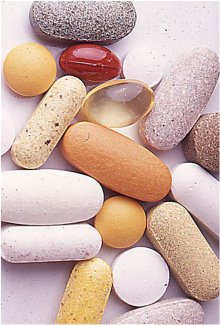 Whole tomato powder - but not lycopene alone - may inhibit the development of prostate cancer, according to an animal study in the Journal of the National Cancer Institute.
Whole tomato powder - but not lycopene alone - may inhibit the development of prostate cancer, according to an animal study in the Journal of the National Cancer Institute. Rats fed diets containing whole tomato powder, which contains lycopene and other compounds, had a lower risk of death from prostate cancer than rats fed diets containing pure lycopene or a standard diet. Moreover, the study found that rats that consumed fewer calories per day had a lower risk of prostate cancer, independent of the composition of their diets.
Lycopene is a carotenoid in tomatoes that provides the familiar red color, and consumption in the diet has been associated with a reduced risk of prostate cancer in epidemiologic studies. It is unclear whether lycopene itself is responsible for the risk reduction. It may be that lycopene is a biomarker for exposure to other anticancer compounds found in tomato products.
Thomas W.M. Boileau, of the University of Illinois, Steven K. Clinton, of the Ohio State University, and their colleagues randomly assigned 194 male rats treated with a carcinogen to induce prostate cancer to diets containing whole tomato powder or pure lycopene, or to a control diet. After four weeks, the rats were further divided into two groups: a group with unlimited access to food and a group that consumed 80% of the average daily intake of the unlimited access group.
Rats fed the tomato powder diet had a 26% lower risk of prostate cancer death than control rats, after controlling for diet restriction. By comparison, rats fed the lycopene diet had a risk of prostate cancer that was not statistically significantly different from control rats. The proportion of rats dying with prostate cancer in the control, lycopene, and tomato powder groups were 80%, 72%, and 62%, respectively.
Rats in the diet-restricted group had a 32% lower risk of dying with prostate cancer than rats with unlimited access to food, after controlling for diet type. There appeared to be no interaction between type of diet and the amount of dietary intake, suggesting that tomato products and diet restriction may have independent benefits.
"Our observations support the concept that tomato products contain components in addition to lycopene that may inhibit prostate carcinogenesis," the authors write. They say that more work is needed to understand the role of the various compounds in tomatoes and to determine whether there are additive or synergistic effects between the compounds.
"Many men are consuming lycopene-containing supplements with the hope that they may prevent prostate cancer or enhance the treatment of their prostate cancer," the authors write. "We suggest that a focus on interventions with whole tomato products and energy balance should be a priority while clinical studies simultaneously investigate the risks and benefits of lycopene supplementation."

